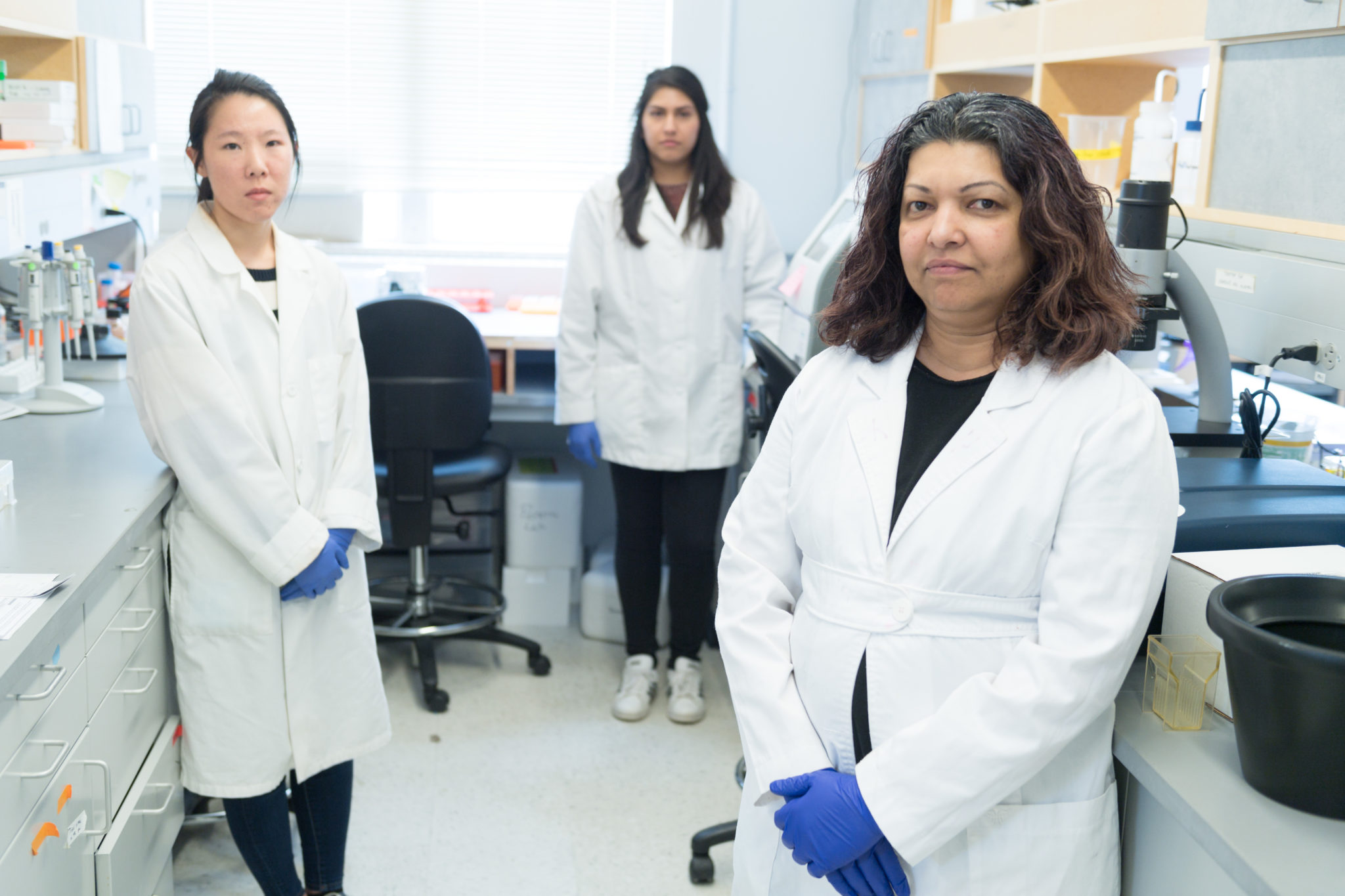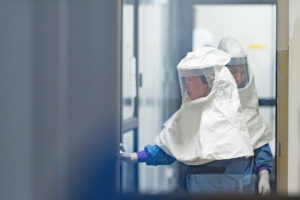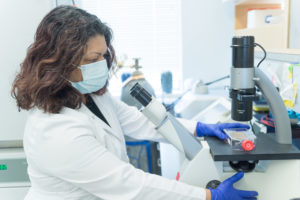
Associate Professor Rushika Perera (right), leads a team that is testing drugs and chemicals to see if they might provide options to fight the virus that causes COVID-19. She is pictured with Research Assistants Elena Lian (left) and Gabriela Ramirez (middle), who also happen to be recent CSU graduates.
Photos: William A. Cotton/CSU Photography
Colorado State University researchers are testing hundreds of existing drugs, compounds and chemicals to see if they might provide options to fight the virus that causes COVID-19. Some of these substances are approved by regulatory agencies to treat conditions including malaria, HIV and hepatitis C and may be repurposed and used in clinical trials to treat people who have contracted COVID-19.
Rushika Perera, associate professor in the Department of Microbiology, Immunology and Pathology, said that many companies are limited in their ability to test the coronavirus, SARS-CoV-2, because they lack the appropriate biosafety level facility. So, they’ve turned to CSU for help.
“A lot of industries are limited with how they can work with the virus,” said Perera, who studies mosquito-borne viruses like dengue, chikungunya, yellow fever and Zika viruses. “They need to partner with CSU to do this research. We have the expertise, labs and physical space.”
The Centers for Disease Control and Prevention recommends that scientists using the virus in research conduct these experiments in a Biosafety Level 3 (BSL-3) laboratory. CSU has been designated as a regional biocontainment laboratory, one of a dozen at universities across the country, to support biodefense and emerging infectious diseases research.

Perera swiftly pivoted from conducting her own research to establish a laboratory in the BSL-3 facility in March. She tapped two recent CSU graduates, Elena Lian and Gabriela Ramirez, to join her team and to help conduct the antiviral testing.
Lian and Ramirez had never worked on this type of project before and have very quickly acquired the capability to test candidate compounds against this virus, Perera said.
“Their commitment to research and learning is exemplary, especially the hours they are willing to work,” she added. Perera said the team is working long days, seven days a week.
Requests for testing
Since the start of the pandemic, CSU has been inundated with requests for testing from companies and organizations in the United States and internationally.
Brian Geiss, associate professor in the Department of Microbiology, Immunology and Pathology, and David Paterson, assistant vice president for research, translation and commercialization, are handling logistics for the project, fielding inquiries from companies and establishing contracts.
“We will be providing companies with a report that says whether these compounds are effective against SARS-CoV-2, or whether they are not,” said Perera. Some of these compounds are clinically approved to treat other viruses, while others might be at more preliminary stage in the regulatory approval process.

Due to nondisclosure agreements with these companies, CSU cannot identify them.
Karen Dobos, professor in the Department of Microbiology, Immunology and Pathology, said that Perera’s team will test disinfectant wipes created by members of CSU’s Mycobacteria Research Laboratories.
Dobos, who also directs CSU’s Research Integrity and Compliance Review Office, said scientists used ethanol, glycerol and hydrogen peroxide to create the wipes and hand sanitizer, which both appear to be effective against SARS-CoV-2.
“We began to make wipes and disinfectant based on information from the Environmental Protection Agency,” she said. “I kept waiting to see if these ingredients would be tested against SARS-CoV-2. To date, ethanol has been tested and reported as effective against the virus, but not hydrogen peroxide as a spray disinfectant. Fortunately for us, Rushika and her team will be able to conduct disinfectant testing.”
Making a difference quickly
Perera said that while the last month or so has been extremely stressful, she is also happy to lead this new research effort.
“I didn’t realize it at first, but now I realize I have a unique opportunity to make a difference quickly,” she said. “It feels amazing as a virologist; this is why I became a virologist to be able to help others.”
Mark Zabel, research associate dean and a professor in the CSU College of Veterinary Medicine and Biomedical Sciences, said Perera exemplifies the adaptability and drive of the university’s infectious disease researchers to tackle big problems in a big hurry.
“Dr. Perera and other infectious disease researchers in our college are applying their collective knowledge, skills, innovation and expertise to tackle some of the most important aspects of COVID-19,” he said.
This research effort is supported with a startup award from the Office of the Vice President for Research and additional support from the Department of Microbiology, Immunology and Pathology at CSU. The financial support has assisted Perera in obtaining basic equipment required for antiviral testing and a state-of-the-art Celigo imaging cytometer that will enable medium-throughput testing capacity.
Perera is part of the Infectious Disease Research and Response Network, one of 21 Programs of Research and Scholarly Excellence at Colorado State University. The IDRRN brings together large research and service programs, and over 60 faculty members from six departments to address local, national and international needs for infectious disease control and prevention.
Award-winning investigator
Perera was recently chosen to receive the American Chemical Society’s Infectious Diseases Young Investigator Award, which recognizes scientists who are making a significant contribution to explaining the underlying biochemistry and the use of biochemical approaches to develop interventions for infectious diseases. She is one of three researchers who will receive the distinction for 2020.
John Belisle, professor in the Department of Microbiology, Immunology and Pathology, said the honor was “a significant and well-deserved award for one of our highly productive and talented faculty members.”